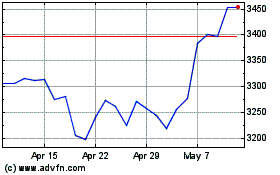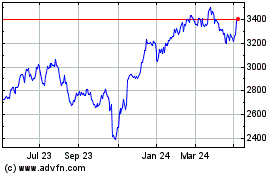Experian’s Annual Future of Fraud Forecast Predicts Five Key Threats for Businesses and Consumers in 2022
20 January 2022 - 10:00PM
Business Wire
Buy now, pay later fraud, romance and
cryptocurrency schemes top the list
Experian® today released its annual Future of Fraud Forecast,
which reveals five fraud threats for the new year. With consumers
continuing to take a digital-first approach to everything from
shopping, dating and investing, fraudsters are finding new and
innovative ways to commit fraud. This year’s threats include:
This press release features multimedia. View
the full release here:
https://www.businesswire.com/news/home/20220120005312/en/
Experian's 2022 Future of Fraud Forecast
(Graphic: Business Wire)
- Buy Now, Pay Never – The Buy Now, Pay Later (BNPL) space
has grown massively recently. In fact, the number of BNPL users in
the US has grown by more than 300 percent per year since 2018,
reaching 45 million active users in 2021 who are spending more than
$20.8 billion1. Without the right identity verification and fraud
mitigation tools in place, fraudsters will take advantage of some
BNPL companies and consumers in 2022. Experian predicts BNPL
lenders will see an uptick in two types of fraud: identity theft
and synthetic identity fraud, when a fraudster uses a combination
of real and fake information to create an entirely new identity.
This could result in significant losses for BNPL lenders.
- Beware of Cryptocurrency Scams – Digital
currencies, such as cryptocurrency, have become more conventional
and scammers have caught on quickly. According to the FTC,
investment cryptocurrency scam reports have skyrocketed, with
nearly 7,000 people reporting losses totaling more than $80 million
from October 2020 to March 20212. In 2022, Experian predicts that
fraudsters will set up cryptocurrency accounts to extract, store
and funnel stolen funds, such as the billions of stimulus dollars
that were swindled by fraudsters.
- Double the Trouble for Ransomware Attacks – In the first
six months of 2021, there was $590 million in ransomware-related
activity, which exceeds the value of $416 million reported for the
entirety of 2020 according to the U.S. Treasury's Financial Crimes
Enforcement Network3. Experian predicts that ransomware will be a
significant fraud threat for companies in 2022 as fraudsters will
look to not only ask for a hefty ransom to gain back control, but
criminals will also steal data from the hacked company. This will
not only result in companies losing sales because of the halt
caused by the ransom attack, but it will also enable fraudsters to
gain access and monetize stolen data such as employees’ personal
information, HR records and more – leaving the company’s employees
vulnerable to personal fraudulent attacks.
- Love, Actually? – Because more consumers went on dating
apps and social media to look for love during the pandemic,
fraudsters saw an opportunity to create intimate, trusted
relationships without the immediate need to meet in-person. The FBI
found that from January 1, 2021 — July 31, 2021, the FBI Internet
Crime Complaint Center received over 1,800 complaints, related to
online romance scams, resulting in losses of approximately $133
million4. Experian predicts that romance scams will continue to see
an uptick as fraudsters take advantage of these relationships to
ask for money or a “loan” to cover anything from travel costs to
medical expenses.
- Digital Elder Abuse Will Rise – According to Experian’s
latest Global Insights Report, there has been a 25 percent increase
in online activity since the start of Covid-19 as many, including
the elderly, went online for everything from groceries to
scheduling health care visits. This onslaught of digital newbies
presents a new audience for fraudsters to attack. Experian predicts
that consumers will get hit hard by fraudsters through social
engineering (when a fraudster manipulates a person to divulge
confidential or private information) and account takeover fraud
(when a fraudster steals a username and password from one site to
takeover other accounts). This could result in billions of dollars
of losses in 2022.
According to Juniper Research, merchant losses to online payment
fraud will exceed $206 billion cumulatively for the period between
2021 and 20255. That’s why it’s crucial that businesses get the
right fraud prevention tools in place to anticipate future scams
and mitigate financial losses.
“Business and consumers need to be aware of the creativity and
agility that fraudsters are using today, especially in our
digital-first world,” said Kathleen Peters, chief innovation
officer at Experian Decision Analytics in North America. “Experian
continues to leverage data and advanced analytics to develop
innovative solutions to help businesses prevent fraudulent behavior
and protect consumers.”
Businesses can use Experian’s suite of fraud prevention and
identity verification tools to stay one step ahead of fraudsters.
Last year, Experian’s fraud prevention solutions helped clients
save $10 billion in fraud losses globally. To learn more about
Experian’s fraud prevention solutions, please visit:
https://www.experian.com/business/solutions/fraud-management.
About Experian
Experian is the world’s leading global information services
company. During life’s big moments — from buying a home or a car to
sending a child to college to growing a business by connecting with
new customers — we empower consumers and our clients to manage
their data with confidence. We help individuals to take financial
control and access financial services, businesses to make smarter
decisions and thrive, lenders to lend more responsibly, and
organizations to prevent identity fraud and crime.
We have 20,000 people operating across 44 countries, and every
day we’re investing in new technologies, talented people and
innovation to help all our clients maximize every opportunity. We
are listed on the London Stock Exchange (EXPN) and are a
constituent of the FTSE 100 Index.
Learn more at www.experianplc.com or visit our global content
hub at our global news blog for the latest news and insights from
the Group.
Experian and the Experian marks used herein are trademarks or
registered trademarks of Experian and its affiliates. Other product
and company names mentioned herein are the property of their
respective owners.
1 The Economic Impact of Buy Now, Pay Later in the U.S.:
https://afterpay-corporate.yourcreative.com.au/wp-content/uploads/2021/10/Economic-Impact-of-BNPL-in-the-US-vF.pdf
2 Federal Trade Commission:
https://www.ftc.gov/news-events/blogs/data-spotlight/2021/05/cryptocurrency-buzz-drives-record-investment-scam-losses
3 U.S. Treasury's Financial Crimes Enforcement Network:
https://www.fincen.gov/sites/default/files/2021-10/Financial Trend
Analysis_Ransomeware 508 FINAL.pdf 4 Federal Bureau of
Investigation: https://www.ic3.gov/Media/Y2021/PSA210916 5 Juniper
Research, Online Payment Fraud: Emerging Threats, Segment Analysis
& Market Forecasts 2021-2025,
https://www.juniperresearch.com/pressreleases/online-payment-fraud-losses-to-exceed-206-billion
View source
version on businesswire.com: https://www.businesswire.com/news/home/20220120005312/en/
Annie Russell Experian
949 683 5243 Annie.Russell@experian.com
Experian (LSE:EXPN)
Historical Stock Chart
From Mar 2024 to Apr 2024

Experian (LSE:EXPN)
Historical Stock Chart
From Apr 2023 to Apr 2024
